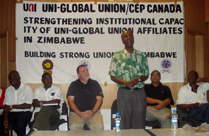New project to strengthen Zimbabwean affiliates

| UNI Global Union and the Communication, Energy and Paper affiliate (CEP Canada) officially launched the project “Strengthening Institutional Capacity of UNI Global Union Affiliates in Zimbabwe” at a meeting attended by more than 200 members from four UNI affiliates in Harare on 21 March. The UNI Zimbabwe Liaison Council President, Madzivo Chimhuka informed the members that the Liaison Council was officially formed in 2007. Chimhuka said that “key to the unity that was brought about by the formation of the Liaison Council, were to strengthen workers struggles given the hardships that the workers went through the past decade when unions were at the verge of total extinction.” Zimbabwe Congress of Trade Unions (ZCTU) President Lovemore Matombo, who officially opened the meeting, praised Zimbabwean workers for their perseverance during the difficult times in Zimbabwe. Matombo said, “For the workers to have survived to this day is a real miracle as the past decade was a disaster in the living memories of Zimbabwean workers.” Matombo said that workers wanted peace as outlined in the Kadoma Declaration and to avoid decisions made by a minority such borrowing from the IMF that brought structural adjustment programs that led to the economic disaster Zimbabweans faced since 1990. And Duncan Brown from the CEP Canada gave a background of the CEP Humanity Fund and informed those present that CEP members contributes one cent per hour of their wages to the Humanity Fund which in turn assist workers in difficulty in countries like Zimbabwe. He encouraged workers to be united and continue their fight for decent work and the attainment of worker rights and those of society at large. Keith Jacobs, the UNI Africa Campaigns and Organising Director, outlined the aims of project as to rebuild the institutional capacity of UNI affiliates in Zimbabwe, to strengthen their capacity to organize and represent workers, grow their membership and build strategic union power and to participate in the current reform processes in the country. The launch was followed by a two day strategic planning seminar, where the leaders of the four unions assessed their strengths, challenges and opportunities and developed a concrete action plan for the year ahead, including research, training workshops, membership outreach and information and organizing campaigns. |

